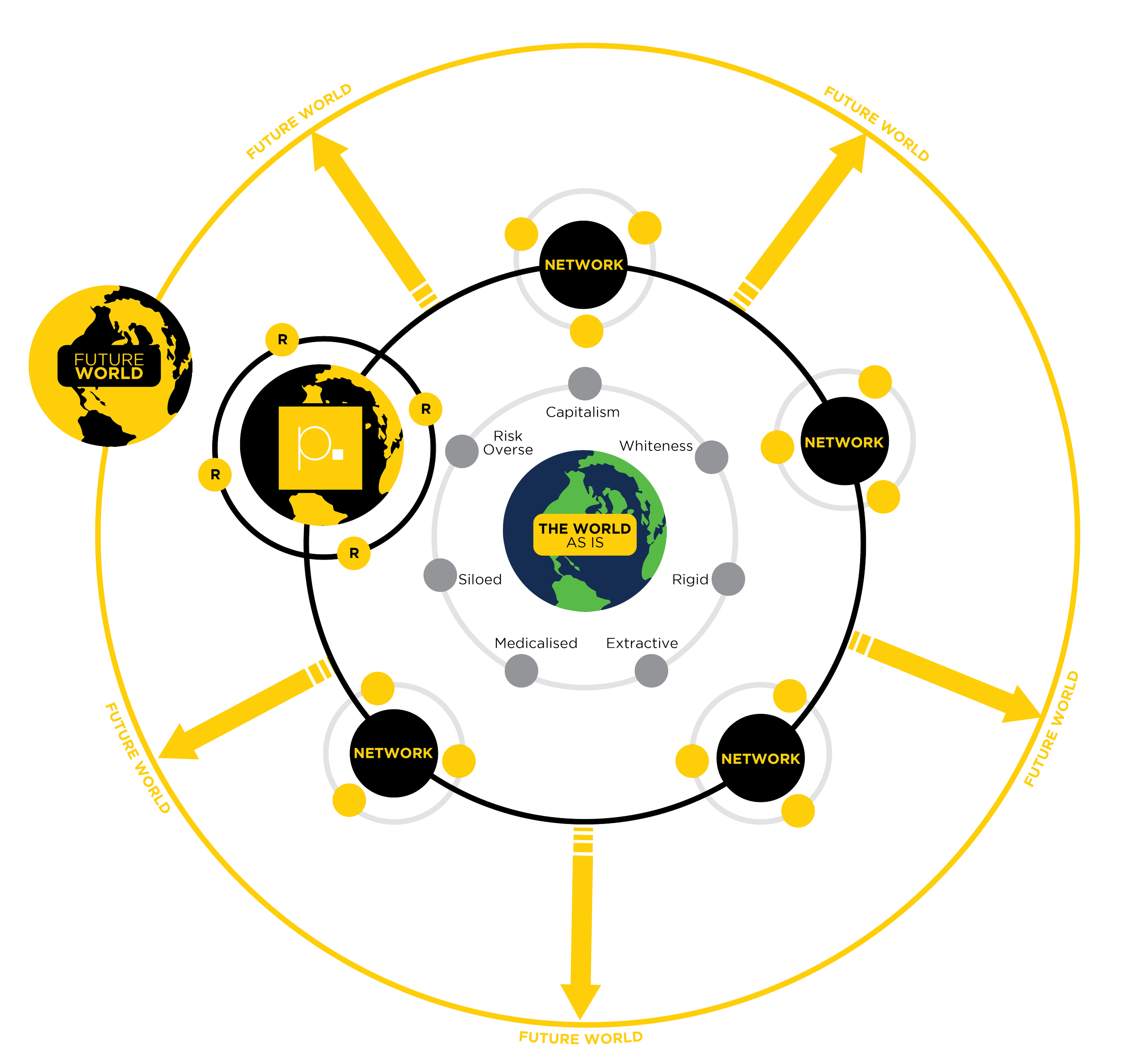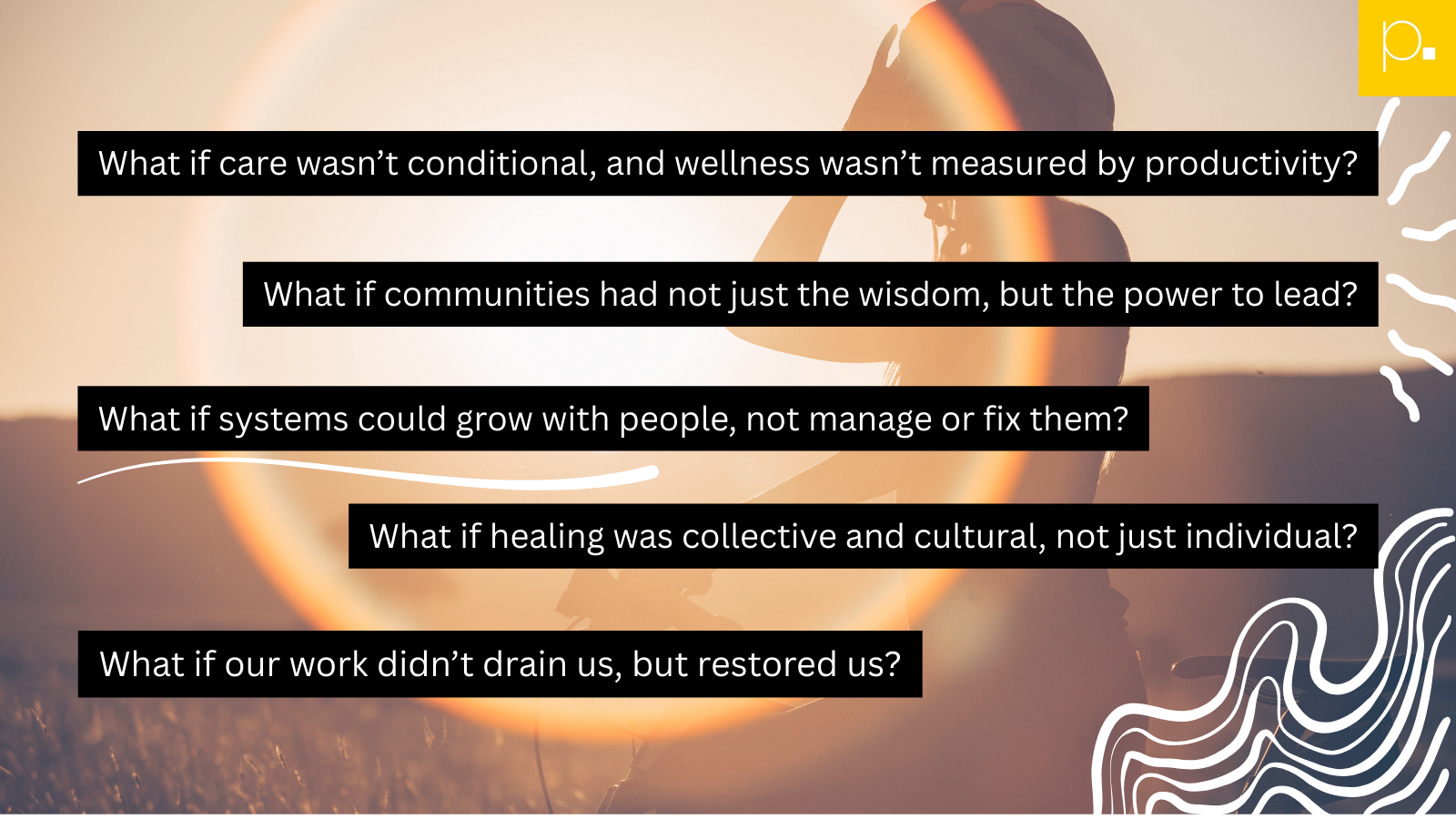Working in the Emergence: the Beginning, not a Blueprint
This blog, by Partisan Founder and CEO, Jay Perkins, launches our Working in Emergence series, based on our Emergent Strategy, to look at different perspectives on systemic change, power and knowledge, and what it’s like to navigate the journey to newer, kinder ways of being from within, for Black and racialised communities.
You can’t read a book from the end: you always have to start from the beginning, and there’s no way to talk about where Partisan is at now without talking about where it all began.
I didn’t come to this community-rooted change work as an observer or because I studied it, I came to it because I’ve lived it and felt it. Yes, I’m a Child and Adolescent Psychotherapist and leader, but first and foremost, I am a member of the Black community who has had to grow up and live in a world that too often misunderstands, dismisses, harms, or simply doesn’t know how to see me.
I’ve lived in the tension between what the education, health and care, mental health, economic, criminal justice, and political systems say they offer and what they actually deliver.
I’ve sat in spaces meant to support yet felt disconnected.
I’ve believed and backed political parties who have then caused further harm.
I’ve trained in therapeutic models that fail to see us fully - failed to hold our pain with context, or recognise our cultural ways of healing.
I’ve worked in systems that have claimed to care but have instead been extractive and transactional, often retraumatising the communities they’re supposedly meant to help, and unable to hold our truth.
That dissonance and disconnection runs deep.
I’ve always known (and felt from being in community) that healing needed to look different for Black and racialised people.
Why I’m Here
As someone who trained inside the system and has been shaped by the outside of it, I hold a dual lens. I know what these institutions ask us to do, and what they cost us.
Partisan was my response to a quiet question I couldn’t shake: “what might be possible if we stopped using all of our time, energy and resources trying to adapt these systems, and started designing alternatives that are for and by us?”. And of course, ever-present was Audre Lorde’s most famous statement as inspiration: “The master's tools will never dismantle the master's house”
So, with others who felt it too, I wanted to build an alternative; something rooted in relationships, justice, and community. That became Partisan. It was born out of both frustration and imagination. Frustration at the systems and structures that continue to oppress and harm us, and imagination from the community who’ve always known how to care.
And since its inception, we’ve moved from working inside mental health systems, to building alternatives on the borders, to working outside of them entirely. Over time, the shape of our work has shifted; from ‘treatment’, to services, to help systems, and now to ecosystems.
We’re not about fixing people, we’re about co-creating the conditions for healing and thriving on a more systemic level, and that means moving away from redesigning what already exists, to designing into what could be.
Working in the emergence is about this - about honouring the unknown - new possibilities - and trusting that co-creation is more powerful than control.
Partisan’s planetary ecosystem.
Download our Emergent Strategy (September 2025) to read more about our role in change-work.
Emergence is NOT a trend, it’s a tradition
Partisan exists because we believe healing and justice cannot be separated.
Traditional mental health systems often locate problems and solutions in individuals, without holding in mind and addressing the context: in peoples housing, schooling, relationships, histories, and current realities of this post-colonial world that is driven by capitalism. I was not interested in ‘improving access’ to, or recreating versions of, the systems that were built and designed to harm us.
Our work grew from a refusal to replicate that thinking, and was a turn to ways of knowing that are collective, adaptive, and deeply relational. As Octavia Butler wrote, “All that you touch, you change. All that you change, changes you.” (Butler, Parable of the Sower).
We are inspired by Emergent Strategy by adrienne maree brown, and equally by what came long before it; ancestral practices that teach us healing is collective, adaptive, and relational. Sankofa, the wisdom to go back and retrieve what matters. Ubuntu, the knowing that “I am because we are”.
These are not frameworks we adopt, they are lineages we walk in.
We’re not rushing toward deliverables because we’re building trust across time.
We expect ruptures, but we stay for repair. We honour pace, presence, and regeneration. And we hold space for redistribution in every sense; of power, voice, decision-making, knowledge, and resources.
Questions to consider for a kinder, more just world:
What we’re learning at Partisan
Building alternatives isn’t neat or easy, and we’re certainly not claiming to have it all figured out. We often get things wrong, and we learn through failure. We speak, not from a place of certainty, but from practice and held accountable by our community.
We’ve learnt:
Capitalism rewards speed, urgency, output, certainty, deliverables, control, scale, quantifiable measures, and extraction. So, much of our work is now about resisting the pull that works against the kind of relational, caring, slow, emergent, co-creational design we’re committed to.
Governance, policy and infrastructure are still catching up. In emergence, clarity comes through doing - through action - not before.
Structures and frameworks rarely arrive at the same pace as the work. This can be frustrating and uncontaining, and some people struggle to operate from this place and to sit with the reality that we will never arrive at eutopia. However this delay and challenge is not failure; it’s a part of the process, a sign that something real is forming, something built from relationships and trust, rather than control.
We stay on this path of change work because it matters, not just professionally, but personally, politically, and emotionally.
It doesn’t always look like ‘success’: sometimes it looks like pausing. Sometimes it looks like pivoting or shifting direction, or asking for more time. We’re not here to perform impact, we’re here to build the conditions for collective thriving, even if that takes more time than the system allows. It’s sometimes hard to imagine beyond this, but we try to hold on to and remember that futures worth living in won’t be created through the logic and lens of what already exists.
We build from the belief that love is not a soft extra, it’s a political force. As bell hooks taught us, love is the foundation of justice. Without it, the systems we create will always fall short.
Often it looks like redistributing power, stepping back so others can step in, resourcing communities to lead, and letting go of the idea that we always have to know.
So much of our work is made up of small acts; listening closely, slowing down, making space, saying “I don’t know”, asking for help. But as the Small Acts of Resistance paper reminds us, these are refusals; of urgency, of extractive care, of systems that demand our silence or compliance. They are how we hold each other while building something different.
When we work relationally, we move at the speed of trust, not urgency. We prioritise care over control, curiosity over expertise. We recognise that relationships aren’t a nice to have, side-effect of good work, they are the work. And that means showing up with integrity, honesty, and the willingness to be changed by each other. We pay attention to the subtle shifts; the conversations, tensions, and quiet trust-building that don’t fit neatly into metrics. Nora Bateson calls this “warm data”, the relational, emotional knowing that’s essential to real systems change.
When we work regeneratively, we look to draw on what came before us; the knowing that healing is cyclical and collective, and everything is interconnected. Audre Lorde reminds us that “Caring for myself is not self-indulgence, it is self-preservation, and that is an act of political warfare.”. Regeneration asks us not just how we sustain the work, but how we sustain ourselves and each other in the process. This isn’t just about avoiding burnout, it’s about working in ways that honour our limits, building capacity over time, making space for rest and reflection, and embedding practices that nourish us, rather than deplete us.
And when we work with a commitment to repair, we stop pretending rupture is a failure. We recognise it as part of any real relationship, especially across power, difference, and history. It’s always easier to avoid repair, but we name and acknowledge harm, and stay with the discomfort, in the hope that we can come back together again. As Mia Mingus, disability justice activist and educator, reminds us, “care without accountability is not care.”
These four areas - redistribution, relationships, regeneration and repair - form the foundations of Partisan.
We no longer look for “scale” in its most traditional sense. Now, we look for alignment.
Our work isn’t about reaching the most people in the shortest time, it’s about staying true to the communities we’re a part of, and building alternative help systems that are accountable to them.
“Small is good. Small is all.” - adrienne maree brown
At Partisan we’re tending to the small, because that’s where everything begins, but our ambitions are big!
If you’re interested in working with us in the emergence, building change together, then we warmly invite you to connect. Email Partisan’s CEO: Jay Perkins at Jay@partisanuk.org.uk to connect.



